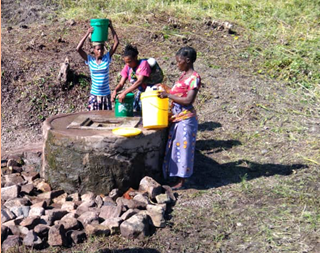
Together We Thrive: How two Villages have Dug Deep to Building Its Future
FAO 2025
10/04/2024
In the quiet lakeside villages of Kalomo and Nzovwe, nestled along the shores of Lake Tanganyika in Nsama District, a powerful transformation is taking root. It began not with large-scale interventions, but with a simple conversation, one that grew into action, unity, and ultimately, clean water. At the heart of this transformation are the FAO Dimitra Clubs, a grassroots community engagement approach designed to empower marginalized groups, especially women and youth, through collective dialogue, gender equality, and shared decision-making. The approach doesn’t parachute in solutions; it nurtures them from within the community itself. When Kalomo and Nzovwe villages were first introduced to the Dimitra concept, the reception was overwhelmingly positive. After community sensitization meetings, the village embraced the idea and established three inclusive clubs, welcoming men, women, youth, and people living with disabilities. These clubs quickly evolved into vibrant forums where residents came together to discuss their challenges and brainstorm solutions.
One of the first major issues to emerge from these discussions was something painfully familiar to many rural communities: lack of access to clean water.
“What struck us was not just that the problem existed, it was how much we had stopped noticing it, some things had become so routine that we no longer questioned them. That was the hardest part, having to realize how much we had accepted without really seeing how we were being affected by the challenge of lacking clean drinking water,” said Chisanga, a community member from Nzovwe village. Using a problem tree analysis, the clubs from the two villages dissected the causes and consequences of the water crisis. They considered the health implications, the time spent by women and girls walking long distances for water, and the limits it placed on crop production and hygiene. With clarity and consensus, the community decided to build something many had only dreamed of, a well.
The vision soon translated into action. Committees, with representatives from each club, were formed to lead the effort. Every stage from identifying the well site to sourcing tools like picks, hoes, and shovels was carried out collaboratively. They even sought the expertise of local specialists to ensure their efforts were sustainable. In Nzovwe, the community begun the process of digging the well from scratch while in Kalomo village, the community members begun the process of rehabilitating the dilapidated water well that was almost being abandoned due to the state in which it was. “Digging the well was not an easy task as the site that had been chosen was rocky and tough. The works were back-breaking due to the rainy weather which caused a delay in the process. However, the community still persevered,” added Chisanga.
Driven by determination and unity, the community members from the two villages that included both young and old, men and women took turns clearing the sites, slashing overgrown grass, and chipping away at the hard earth day after day. Their sweat and solidarity slowly pushed them closer to the goal.
While it took weeks of intense labour, the community members in Nzovwe village broke through and reached the water table. The moment was met with cheers, tears, and a deep sense of achievement. Mary, another member of the Nzovwe village, summed up the mood best: “We now have clean water because of the efforts of the Dimitra Club. The clubs have shown us the importance of working together. If we continue to work together, our village will be in a better place,” added Mary. In Kalomo, the water well had been there for years, but no one used it because it was in such a bad state. The community members used to walk long distances to fetch water, even though a well was right here. When we started identifying the problem identification, they realized that they did not have to wait for someone else to fix the water well and that they could do it themselves. Now, the whole village is using the water well again. Chilekwa Bweupe, the ZCCP-Dimitra Clubs Initiative Coordinator, reflected on the broader impact of the initiative: “What we are witnessing in Kalomo and Nzovwe is more than access to clean water, it's a shift in gender roles, a new recognition of women’s voices, and a community-wide commitment to health and dignity. The footprints of this initiative are visible in improved sanitation, strengthened community cohesion, and a transformed understanding of who leads change, everyone, together,” added Chilekwa.
Today, the wells stand not only as a source of life but as a symbol of what can happen when communities come together around a shared goal. It quenches thirst, nourishes crops, and reinforces a sense of pride and possibility that extends beyond the water’s edge. “In the beginning, most people didn’t see the need to talk about these issues. It was just how things had always been, but when you sit with the women, the young people, even the men, they will tell you things have been hard. The Dimitra Clubs did not just arrive with answers, through this approach, people started asking questions they had not dared to before,” said Masiliso Phiri. She added that the promising practices in Kalomo and Nzovwe villages are among the many examples of social cohesion and resilience building interventions implemented through an integrated, community-based and multi-partner approach of Dimitra. The story of Kalomo and Nzovwe villages is a testament to the power of local action. It demonstrates that lasting change doesn’t always come from outside intervention. Sometimes, it comes from within from voices long unheard, now united in purpose. As the community members from the two villages draw water from their newly built and rehabilitated water wells, they also draw hope, hope that their collective spirit can take them even further.
